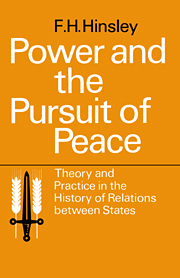Book contents
- Frontmatter
- Contents
- INTRODUCTION
- PART I A HISTORY OF INTERNATIONALIST THEORIES
- 1 To the End of the Seventeenth Century
- 2 Penn, Bellers and Saint-Pierre
- 3 Rousseau
- 4 Kant
- 5 Bentham and James Mill
- 6 The First Half of the Nineteenth Century
- 7 From the Crimean War to the League of Nations
- PART II A HISTORY OF THE MODERN STATES' SYSTEM TO 1900
- PART III INTERNATIONAL RELATIONS AND INTERNATIONAL ORGANIZATIONS IN THE TWENTIETH CENTURY
- References
- Index
5 - Bentham and James Mill
Published online by Cambridge University Press: 11 January 2010
- Frontmatter
- Contents
- INTRODUCTION
- PART I A HISTORY OF INTERNATIONALIST THEORIES
- 1 To the End of the Seventeenth Century
- 2 Penn, Bellers and Saint-Pierre
- 3 Rousseau
- 4 Kant
- 5 Bentham and James Mill
- 6 The First Half of the Nineteenth Century
- 7 From the Crimean War to the League of Nations
- PART II A HISTORY OF THE MODERN STATES' SYSTEM TO 1900
- PART III INTERNATIONAL RELATIONS AND INTERNATIONAL ORGANIZATIONS IN THE TWENTIETH CENTURY
- References
- Index
Summary
Like Rousseau and Kant, Bentham broke with the traditional internationalist theory that had come to a head in the arguments of Penn and Saint-Pierre. He broke with it even more decisively, indeed, than they did. Rousseau like most writers since Sully's day―since Dante's day if pacifists and religious writers are excepted―had begun by supposing that states would not be able to follow their real interests and avoid war unless some political union was established between them. His perception had contradicted this assumption but had not led him to abandon it. Instead, he had concluded on a note of despair: political union, the one solution, was unattainable, not to say undesirable if ever attained, because of the conflict between even the real interests of states. Kant had not made this assumption or ended in despair; but he had been at pains to demonstrate why the goal of international integration was unattainable and undesirable and ought to be abandoned. For Bentham international integration was not so much unattainable and undesirable as utterly unnecessary, and it was also unnecessary to show why this was so. Perhaps this was why he himself published no plan for perpetual peace. His Plan for an Universal and Perpetual Peace was one of four manuscripts written between 1786 and 1789 which were put together after his death to form his Principles of International Law.
- Type
- Chapter
- Information
- Power and the Pursuit of Peace: Theory and Practice in the History of Relations Between States , pp. 81 - 91Publisher: Cambridge University PressPrint publication year: 1962



